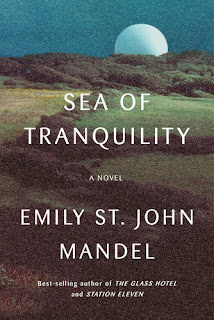Book Review - Sea of Tranquility
I had the great pleasure of introducing Emily St. John Mandel at the Milwaukee Public Library's Literary Luncheon, along with her interviewer, Marcella Kearns. It was my first time experiencing the Pabst Mansion, a.k.a. the Wisconsin City Club, and I loved every minute. But I was limited to only two pages and couldn't really go into much depth regarding Sea of Tranquility, or what a wonderful read it was. I also had to submit my first draft for the speech prior to the book's release, so I really didn't have much ability to go into any depth about it. So this is finally my opportunity to say all the things about St. John Mandel's new book I couldn't say then, starting with this:
It's a fucking great book.
Emily St. John Mandel is currently best known for her novel, Station Eleven, which has been made into a series on HBO Max. Her subsequent novel, The Glass Hotel, was also a hit, and is also being developed into an HBO series.
The story begins with Edwin St. Andrew, who in 1912, dares to question his privileged status in front of his father and gets exiled to Canada. While there, he sees a strange shimmer, hears a violin and the whoosh of an airship - something not invented yet in his time. He believes himself to be losing his mind.
As in St. John Mandel's other books, the story shifts to another timeline, as a strange anomaly takes place in 1994 while a woman named Vincent (yes, really) was being videotaped. In 2020, Mirella, who was once Vincent's best friend, is shocked to learn she is dead. She pursues her filmmaker of a brother, who shot the footage, and he tells her how she died - lost at sea while working as a merchant marine. Yet something still doesn't sit right with her. She encounters a strange man named Gasbury who asks her if Vincent had ever mentioned the video. Suddenly, she remembers she's seen him before when she was a little girl. He's a time-traveler!
Now the story shifts two centuries into the future to a woman named Olive Llewellyn. She is an analog to St. John Mandel herself - a bestselling author who on a tour for her bestselling book, and not especially liking the public attention. Like her present-day self, rumors of a pandemic swirl on the news, and she wonders how serious this might be, even as she reflects on the fact that she wrote a novel about a pandemic.
Fast forward even further to the 25th Century. No, we don't find Buck Rogers. We find Gasbury-Jacques Roberts, a man with intelligence and drive, but whose life has been lackluster. When he learns of his sister's involvement in time travel, he realizes that he wants in. She refuses, but a chance encounter with an old friend gets him a second chance. By now, the reader is already speculating that this is the same Gasbury who Mirella encountered before, so we know he goes back in time. The questions become how and when. Gasbury's first assignment is investigating the anomaly involving Vincent in 1994.
Eventually, all the puzzle pieces of the separate timelines fall into place, and one sees that the anomalies are all interconnected, as are the events surrounding them. Everything comes together so well, and I cannot say more without spoiling things.
Three amazing concepts come out of this book that blew me away. First was the idea that one cannot travel back in time without changing history in some way. This stands out for me, because in my own writings, I postulate the exact opposite - that one cannot change history by going back in time no matter how hard one tries. The second is an intriguing form of punishment that involves setting a future criminal up to take the fall for a crime in the past. Why waste one's own resources incarcerating someone when you can just have previous law enforcement do it for you? And the third is the most amazing of all - that time travel is only possible because what we think of as "reality" may only be a simulation. That may sound like sophomoric solipsism, but it would explain a great deal about why time travel is found so frequently in science fiction, and yet seems so impossible based on what we currently know about quantum physics.
The story and it's inter-weaving puzzle pieces would be enough, but those world-beating ideas make the story so much more. Emily St. John Mandel weaves them all together in a way which allows her to simply have fun - and lets us have fun too along the way. I highly recommend this book, and it will surely make my Hugo recommendations list in February of 2023.
Eric
*




Comments
Post a Comment